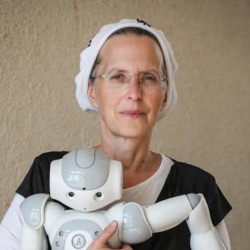Welcome to HAI 2018

HAI 2018 is the 6th annual International Conference on Human-Agent Interaction. It aims to be the premier interdisciplinary venue for discussing and disseminating state-of-the-art research and results that reach across conventional interaction boundaries from people to a wide range of intelligent systems, including physical robots, software agents and digitally-mediated human-human communication. HAI focusses on technical as well as social aspects.
The theme for HAI 2018 is Trustworthy Interaction. During the last decade, much research has been devoted to increasing the interaction quality between humans and artificial intelligent agents. At the same time, more and more intelligent systems are generating decisions, either autonomously or with people “in-the-loop”. Many questions arise when considering the trustworthiness of intelligent systems, operating on their own or in collaboration with people. Do users trust these systems? Do the systems trust people? How can systems gain users’ trust, and vice versa? What happens if trust is lost? How is trust modelled? How is trust evaluated?
As robots and agents enter our everyday lives, interactions will require more initiative and flexibility from agents, i.e., greater autonomy and intelligence; however, outcomes may be less predictable. Current research trends which emphasise statistical behaviour models constructed from observations may only capture rather shallow structures and may overlook more complex aspects that underly less restricted exchanges. We strive for better understanding and models of interaction principles that take into account not only situational and task aspects but also detailed user models. More research is necessary to lead the way towards deeper and more robust models of human-agent interaction. HAI encourages contributions that tackle these questions in realistic, practical settings.
Full papers, posters, late-breaking results, and tutorial/workshop overviews will be archived in the ACM Digitial Library. Selected papers will be invited to submit to a special issue of the Knowledge Engineering Review journal.








